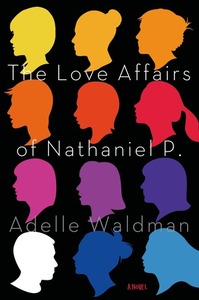Take a photo of a barcode or cover
Should've passed on this one. Self-interested and whiny characters that reminded me of the few things I didn't like about living in NYC.
This book is a nightmarish rendition of one or two dates that I have had the misfortune to experience in my lifetime. The "protagonist" -- if we're being generous here -- is a textbook manifestation of dating "that guy."
"That guy" will manipulate your concerns for basic human communication skill as you simply over-reacting. "That guy" will make it all in your head. "That guy" will date your friends and then their friends. "That guy" despite enlightened ideals is actually a huge misogynist. "That guy" is terrible at sex. The reader is forced to trudge through this novel through the hope that another character will call out this completely despicable human being. Instead, we meet even more useless characters that just seem to tolerate him.
Kudos to Waldman, for making me want to scream a Wilhelm Scream in the middle of Barnes & Noble. If the person you are dating ever acts like this, leave.
"That guy" will manipulate your concerns for basic human communication skill as you simply over-reacting. "That guy" will make it all in your head. "That guy" will date your friends and then their friends. "That guy" despite enlightened ideals is actually a huge misogynist. "That guy" is terrible at sex. The reader is forced to trudge through this novel through the hope that another character will call out this completely despicable human being. Instead, we meet even more useless characters that just seem to tolerate him.
Kudos to Waldman, for making me want to scream a Wilhelm Scream in the middle of Barnes & Noble. If the person you are dating ever acts like this, leave.
As a fifty-one year old reader from the Midwest, at times I felt I was too old and removed from this book to bring it into my realm. Yet I found it on a booklist from which I have loved every book. So I read some Goodreads reviews and decided not to abandon the book, but to plod on. I'm glad I did. This book is a character study of the millennial man's psyche. Filled with irony, Nathaniel wrote, spoke, and felt he was truly a liberal champion of women and the underdog. Yet his actions were quite the opposite. He easily takes the blame for failed relationships, yet really sees nothing wrong with his actions. I didn't like Nathan. I don't think he was written to be liked. But I do think the novel presents a valid portrait of a portion of our population in 2017. It's not always a pretty picture.
This novel made me love to hate Nate Piven. At times, well the majority of the novel, I wanted to whack him over the head with this book. Waldman did such a wonderful job in creating this character, however, I hated him so much I had a hard time continuing to read it at points because I was so infuriated with him! Regardless the novel was still insightful although not so delightful.
THIS is how guys think, and how guys think women are! Witty, dry, urbane, intellectual, and amazingly and alarmingly real, a pretentious Harvard grad in Brooklyn, a writer who is smart and seems to play at being intellectual dates a variety of women who he always manages to find something wrong with. He is at times reflective, at times - insecure, overconfident, wise, immature, able to decompartmentalize - at times maddeningly so - I found the book both annoying and engaging but honest and very 'today'
This book had some of the most relatable (and questionable) characters I've found in a while, guess that doesn't reflect too well on me. The book takes the somewhat shallow theme of "dating" (among mostly-white upper-middle-class intellectual americans) and gives it actual depth. It's beautifully written, its funny and it's enraging and scary in its accuracy.
After I finished this book I had the impulse to slap my husband just because he's a guy... Than I remembered he's awesome and he's nothing like Nate so I hugged him instead!
I can't still believe ut was written by a woman... She just nailed it... I had to go back to the cover and check a couple of time to be sure... I'm definitely going to read more about her because if she can write about a guy so well I can only imagine what she can do with women.
I can't still believe ut was written by a woman... She just nailed it... I had to go back to the cover and check a couple of time to be sure... I'm definitely going to read more about her because if she can write about a guy so well I can only imagine what she can do with women.
informative
reflective
tense
medium-paced
Plot or Character Driven:
Character
Strong character development:
No
Loveable characters:
No
Diverse cast of characters:
No
Flaws of characters a main focus:
Yes
I really wanted to love this book. After seeing it all over Instagram and while browsing through past Book of the Month options, I added it to my book haul thinking it sounded like something I would enjoy. The Boston Globe described Adelle Waldman as being somewhat of a modern-day Jane Austen.
As a young woman who idolized Elizabeth Bennet all through undergrad, I struggled to see it. Maybe my expectations were too high. Here’s what I did agree with, though: Waldman is shrewdly observant of the social nuances of today’s dating world as it relates to members of the opposite sex. The shallowness, the selfishness, the ghosting—Waldman nailed it.
Read the full review at Story Darlings.
As a young woman who idolized Elizabeth Bennet all through undergrad, I struggled to see it. Maybe my expectations were too high. Here’s what I did agree with, though: Waldman is shrewdly observant of the social nuances of today’s dating world as it relates to members of the opposite sex. The shallowness, the selfishness, the ghosting—Waldman nailed it.
Read the full review at Story Darlings.
One of the greatest boons I discovered upon discovering dating was not the tenderness of someone’s arm around your waist or the security of always having Friday night plans but the ability to ask boys everything I ever wanted to know about them but wasn’t daring enough to ask. I have pestered every one of my boyfriends with the same questions: How do you talk about girls with your friends? What do you truly look for in a girl? Why did you really break up with your ex? Are you actually that obsessed with porn? Yes? Okay, well why?
Because although our brains are identical at birth, by our 20s boy brains have been masculinized and girl brains feminized, even if we grew up in the most liberal of households, and my inquiring mind wants to explore and understand these differences. Boys and girls are taught to approach the world in fantastically different ways, so dating, that ritual where we, along with our socially acquired differences, interact most intimately, can become a disaster real fast.
For example, a quick google search for what men are looking for in a girlfriend brings you to this top 10 list which includes “She lets you be a man” and “She respects you.” A lengthier female equivalent, 21 Things To Look For In A Boyfriend, includes “He loves your laugh, even your ugly laugh” and “He knows your favorite dish at the Thai place is. He knows what movie you two watched on your first date. He knows the blanket you love to curl up with when reading.” If we take these articles to represent societal standards, it is abundantly obvious how incompatible the “average” man and woman’s dating goals are. And so dating is this fraught, often bloody battlefield simply because boys and girls taught to approach sex and relationships differently.
The Love Affairs of Nathaniel P. depicts the inevitable dating explosion that arises when two people cannot overcome this cultural indoctrination. It’s especially interesting because the protagonist, Nathaniel P, a budding Brooklynite writer with a book deal (did I mention he has a book deal? Because Nathaniel P. wants everyone to know he has a book deal), is aware that social forces have influenced his utter romantic failures, but he’s so weak that he cannot rid himself of these nefarious influences to find Truth and Happiness in a relationship.
Nate is one of the most frustrating and brilliant characters I’ve encountered in a while. He’s the prototype of a white, urban, intellectual male with heaps of liberal guilt. He has this guilt, yet he lacks the guts to surmount it. He knows, for instance, that men and women are equal intellectually, and regrets that a misogynistic culture refuses to acknowledge that, but then he wonders which male academic his girlfriend is quoting when she makes a particularly salient argument. And thus Nate wallows. He thwarts himself, searching for ways to be unhappy because he doesn’t believe he has a right to be happy nor does he even know what would make him properly happy.
The closest he comes to discovering happiness is his relationship with Hannah, also a brilliant young writer, though without a book deal (Nate would like you to know that Hannah does not have a book deal, though he, Nathaniel P, does have a book deal). Unlike his previous girlfriends, Hannah actually challenges Nate. Their relationship is intellectually demanding, and Nate, misogynized subconsciously since birth, fears this. He fears the equal he recognizes in Hannah. Therefore he sabotages their relationship, even though it’s the only thing that brings him real, unfiltered, incandescent joy instead of mere contentment.
Read this book to observe a promising relationship fall apart because a boy has been taught, blindly and unwillfully, to always prelude every date with “I’m just not looking for a relationship right now.” Read this book if you’re the type of person who hears that line and then asks, “Okay, sure…but why exactly?”
Waldman, in precise, piercing prose, dissects the anatomy of a “modern man” to expose what she calls "a certain type of male thinking." When she cuts Nate up, what you see is terrifying, and the best evidence that socialized gender norms not only hurt women but men too.
Because although our brains are identical at birth, by our 20s boy brains have been masculinized and girl brains feminized, even if we grew up in the most liberal of households, and my inquiring mind wants to explore and understand these differences. Boys and girls are taught to approach the world in fantastically different ways, so dating, that ritual where we, along with our socially acquired differences, interact most intimately, can become a disaster real fast.
For example, a quick google search for what men are looking for in a girlfriend brings you to this top 10 list which includes “She lets you be a man” and “She respects you.” A lengthier female equivalent, 21 Things To Look For In A Boyfriend, includes “He loves your laugh, even your ugly laugh” and “He knows your favorite dish at the Thai place is. He knows what movie you two watched on your first date. He knows the blanket you love to curl up with when reading.” If we take these articles to represent societal standards, it is abundantly obvious how incompatible the “average” man and woman’s dating goals are. And so dating is this fraught, often bloody battlefield simply because boys and girls taught to approach sex and relationships differently.
The Love Affairs of Nathaniel P. depicts the inevitable dating explosion that arises when two people cannot overcome this cultural indoctrination. It’s especially interesting because the protagonist, Nathaniel P, a budding Brooklynite writer with a book deal (did I mention he has a book deal? Because Nathaniel P. wants everyone to know he has a book deal), is aware that social forces have influenced his utter romantic failures, but he’s so weak that he cannot rid himself of these nefarious influences to find Truth and Happiness in a relationship.
Nate is one of the most frustrating and brilliant characters I’ve encountered in a while. He’s the prototype of a white, urban, intellectual male with heaps of liberal guilt. He has this guilt, yet he lacks the guts to surmount it. He knows, for instance, that men and women are equal intellectually, and regrets that a misogynistic culture refuses to acknowledge that, but then he wonders which male academic his girlfriend is quoting when she makes a particularly salient argument. And thus Nate wallows. He thwarts himself, searching for ways to be unhappy because he doesn’t believe he has a right to be happy nor does he even know what would make him properly happy.
The closest he comes to discovering happiness is his relationship with Hannah, also a brilliant young writer, though without a book deal (Nate would like you to know that Hannah does not have a book deal, though he, Nathaniel P, does have a book deal). Unlike his previous girlfriends, Hannah actually challenges Nate. Their relationship is intellectually demanding, and Nate, misogynized subconsciously since birth, fears this. He fears the equal he recognizes in Hannah. Therefore he sabotages their relationship, even though it’s the only thing that brings him real, unfiltered, incandescent joy instead of mere contentment.
Read this book to observe a promising relationship fall apart because a boy has been taught, blindly and unwillfully, to always prelude every date with “I’m just not looking for a relationship right now.” Read this book if you’re the type of person who hears that line and then asks, “Okay, sure…but why exactly?”
Waldman, in precise, piercing prose, dissects the anatomy of a “modern man” to expose what she calls "a certain type of male thinking." When she cuts Nate up, what you see is terrifying, and the best evidence that socialized gender norms not only hurt women but men too.





